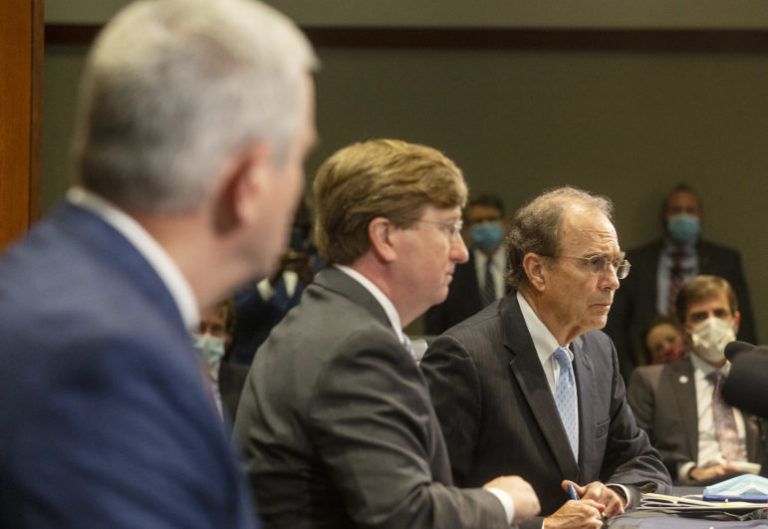

Eric J. Shelton/Mississippi Today
House speaker Philip Gunn, from left, and Gov. Tate Reeves listen as Lt. Gov. Delbert Hosemann speaks at the start of Gov. Tate Reeves’ COVID-19 press conference at the State of Mississippi Woolfolk Building in Jackson, Miss., Thursday, May 7, 2020.
Before the House and Senate negotiators signed an agreement late Wednesday night to provide $300 million in grants to small businesses impacted by the coronavirus pandemic, they allowed Gov. Tate Reeves’ chief legal counsel David Maron time to review the bill.
The governor’s staff being involved in the negotiating process of the deal is notable considering that a week earlier, the Legislature and governor engaged in a heated public debate over who had the authority to appropriate the funds.
Lt. Gov. Delbert Hosemann and House Speaker Philip Gunn, who argued successfully a week earlier it was the Legislature and not the governor who had authority to appropriate the federal funds, said on Thursday that the governor’s staff was involved during the final days as legislative leaders hammered out the program.
The $300 million program for small businesses was created with a portion of the $1.25 billion in federal funds Mississippi received to help pay costs associated with the coronavirus.
In his own press conference on Thursday, Reeves praised legislators for passing the proposal. He suggested he would soon sign the bill into law, though he said he needed time to study it.
“I appreciate the legislative leadership and the work they have done,” Reeves said. “My priority from day one has been the quick release of these funds to get them to the people who need them… I am happy it can happen soon. It will never happen as quick as I would like, but I know we are through the first stage of the negotiations process. I am grateful to everyone who got involved.”
One of Reeves’ previous arguments for why he should have sole discretion to disburse the funds was that he could do so much quicker than legislators who would be hamstrung by the burdensome legislative process.
But now the ball is in the governor’s court. The program will be administered by the Mississippi Development Authority, which he oversees. MDA must develop a process to allow small businesses, defined as having fewer than 50 employees, to apply to receive grants of between $1,500 and $25,000 to cover their coronavirus-related costs. These are businesses that were forced to close or closed voluntarily because of the pandemic.
About 30,000 small businesses that were forced to close will receive checks of $2,000. The companies receiving the direct checks can also apply for the MDA grants.
Leaders would not say Thursday how quickly the payments would go out, but the direct checks should go out much quicker since the businesses do not have to apply for them.
Legislators and Reeves both agreed that helping small businesses forced to close because of the pandemic should be the first priority in how to spend the federal funds.
“I have said that Wall Street will be fine, but it is Main Street that I am worried about,” Reeves said.
Legislators, who overwhelmingly approved the bill late Wednesday night, agreed.
“When Mississippi’s economy is thriving, it is because our small businesses are thriving,” Hosemann said. “This crisis has hit our small businesses hard. We need to support them now by pushing this money the federal government provided the state down to them as quickly as possible.”
After wrapping up work on the small business program, the Legislature recessed until May 26. When they come back, they will resume the work that had been underway before the coronavirus hit, but they will also consider other areas where they believe the federal funds should be spent, such as helping local governments and hospitals. They also are focused on trying to improve distance learning for public school students in the state.
Reeves said on Thursday he will remain in talks with legislative leadership about how the rest of the federal funds should be spent.
The post Reeves and legislative leaders, at bitter odds last week, pat each other on the back over small business relief program appeared first on Mississippi Today.
- State fire marshal is investigating troubled Unit 29 at Parchman prison - February 26, 2026
- Mississippi’s Winter Storm Fern losses exceed $107 million, state insurance department says - February 26, 2026
- DNA evidence linked to a Greenville homicide is missing. Now the finger-pointing begins - February 26, 2026